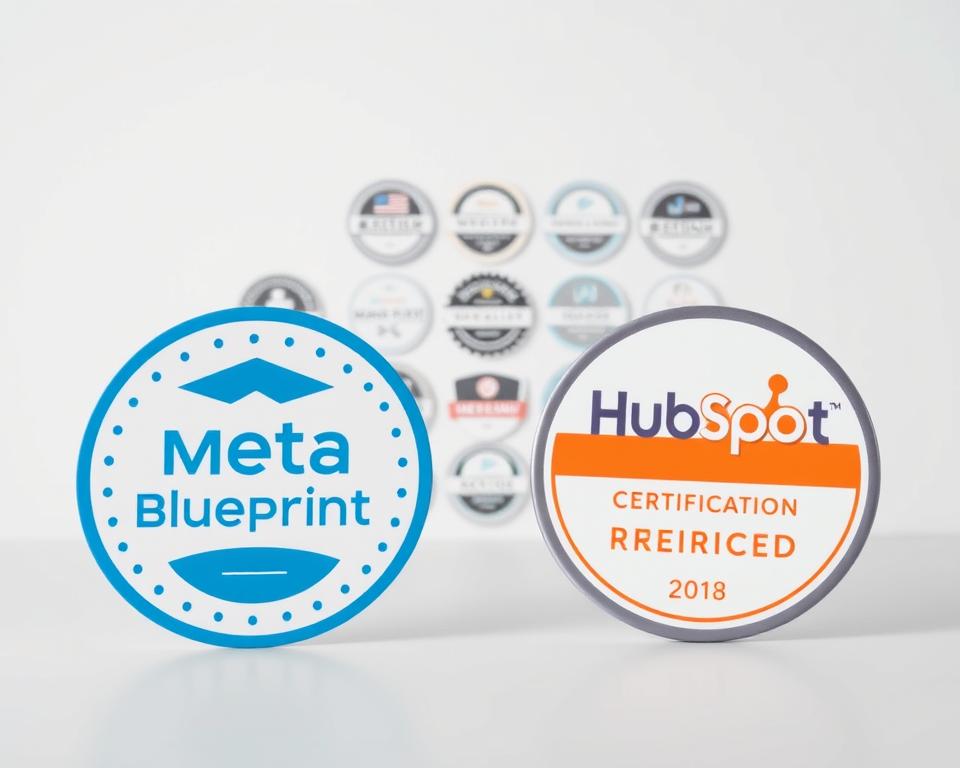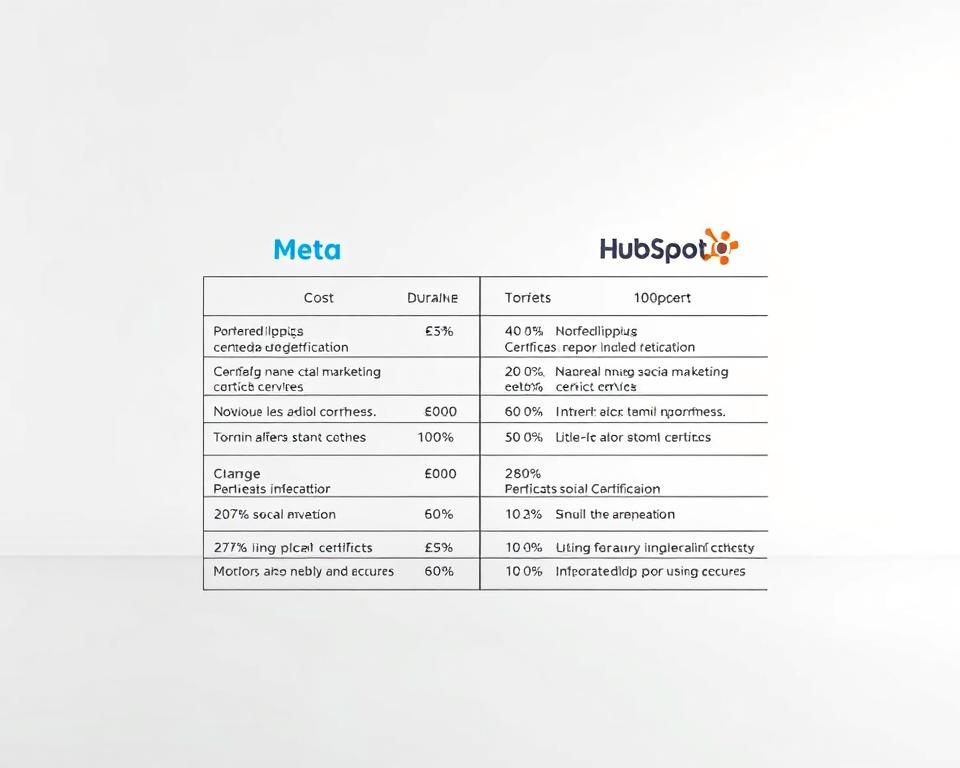
Meta vs. HubSpot: Which Social Media Marketing Certification Is Better?
In a world where the digital ad market is projected to hit $1.04 trillion by 2030, how do you stand out in the competitive landscape of digital marketing? With the average marketing specialist earning $71,150 annually, the right certification can be a game-changer for your career.
Certifications are more than just credentials; they validate your skills and expertise in a rapidly evolving field. Whether you’re focusing on platform-specific strategies or inbound marketing, these programs can open doors to advanced roles and higher earning potential.
But with so many options available, how do you choose the right one? This article dives into the key differences between two leading certifications, helping you make an informed decision for your career growth.
Key Takeaways
- Certifications are essential in the $1.04 trillion digital ad market.
- Platform-specific expertise vs. inbound marketing focus.
- Certifications validate skills for career advancement.
- Rising demand for paid and organic social strategies.
- Higher earning potential for certified professionals.
Introduction to Meta and HubSpot Certifications
The digital marketing landscape is evolving rapidly, and certifications are becoming essential for professionals. They not only validate your skills but also provide structured learning paths to master modern strategies. Two prominent names in this space are Meta and HubSpot Academy, each offering unique programs tailored to different needs.
Meta’s Blueprint program focuses on platform-specific expertise, particularly Facebook and Instagram ads. It offers six certifications across three proficiency levels, including Digital Marketing Associate, Community Manager, and Media Buying. These programs are ideal for professionals looking to specialize in paid social strategies.
On the other hand, HubSpot Academy emphasizes a holistic approach to inbound marketing. Its certifications, such as Content Marketing, Inbound Marketing, and Email Marketing, integrate seamlessly with its CRM tools. This makes it a great choice for those seeking a comprehensive understanding of customer relationship management.
While Meta’s certifications require paid exams ranging from $99 to $150, HubSpot offers free courses with a $199 exam for its Social Media Strategy certification. Both programs provide valuable resources, but their methodologies differ significantly. Meta focuses on paid advertising, whereas HubSpot emphasizes organic, inbound strategies.
| Feature | Meta Blueprint | HubSpot Academy |
|---|---|---|
| Focus | Paid social strategies | Inbound marketing |
| Certifications | 6 (e.g., Media Buying, Creative Strategy) | Multiple (e.g., Content Marketing, Email Marketing) |
| Exam Cost | $99-$150 | Free courses, $199 exam |
| Learning Resources | Free training materials | Structured learning paths |
Both programs cater to different aspects of the marketing field. Whether you’re aiming to specialize in paid campaigns or master inbound methodologies, these certifications can significantly boost your career prospects.
Meta vs. HubSpot: Key Differences in Certification Programs
Choosing the right certification can shape your career in media marketing. Both programs offer unique approaches, catering to different skill sets and career goals. Understanding their differences ensures you pick the one that aligns with your aspirations.

Meta Certification Overview
Meta’s certification programs are designed for professionals aiming to master platform-specific strategies. They focus on Facebook and Instagram ad creation, community management, and AI-driven media buying. Here’s what sets them apart:
- Focus: Paid advertising on Facebook and Instagram.
- Levels: Beginner (Associate) to Advanced (Marketing Science).
- Tools: Ads Manager, Creative Hub, and Marketing API integration.
These certifications are ideal for those looking to specialize in paid campaigns and advanced advertising techniques.
HubSpot Certification Overview
HubSpot’s certifications take a broader approach, emphasizing omnichannel strategies and CRM integration. They focus on content strategy, lead nurturing, and multi-platform campaign analytics. Key highlights include:
- Focus: Content strategy and lead generation across platforms.
- Key Courses: Social Media Strategy (5 hours), Content Marketing (4 hours).
- Unique Value: CRM-powered attribution modeling for tracking social ROI.
This program is perfect for marketing professionals seeking a comprehensive understanding of inbound strategies.
Both certifications offer valuable skills, but their focus areas differ significantly. Whether you prefer platform-specific expertise or a broader marketing approach, these programs can elevate your career in media marketing.
Cost and Duration Comparison
Time and money are critical factors when choosing a certification program. Understanding the total investment helps you make an informed decision. Let’s break down the costs and time commitments for each path.
For Meta, the exam fees range from $99 to $150 per certification. There are no recurring fees, but you’ll need to dedicate 10 to 20 hours of prep time for each test. This self-paced training allows flexibility but requires discipline.

HubSpot offers free courses, but the exam for its Social Media Strategy certification costs $199. The course itself takes about 4 hours to complete, making it a quicker option for busy professionals.
Here’s a quick comparison of the key points:
- Meta: $99-$150 per exam, 10-20 hours of prep, self-paced learning.
- HubSpot: Free courses, $199 exam fee, 4-hour completion time.
When analyzing the cost-benefit, Meta’s programs focus on niche expertise in paid advertising. HubSpot, on the other hand, emphasizes transferable CRM skills that apply across industries.
Recertification is another factor to consider. Meta credentials are perpetual, unlike some programs that require annual renewal. However, Meta recommends a $249/year Blueprint subscription for access to practice exams and updated materials.
Understanding these details ensures you choose a program that aligns with your career goals and budget.
Course Content and Learning Outcomes
Understanding the course content is crucial for choosing the right certification. Each program offers unique skills and topics tailored to different career paths. Let’s explore what you’ll learn and how it can benefit your professional growth.

Meta Course Content
Meta’s program focuses on technical ad skills, preparing you to manage paid campaigns effectively. You’ll dive into modules like campaign troubleshooting, creative brief development, and ROAS optimization. These topics are designed to help you master the intricacies of paid advertising.
Hands-on learning includes building lookalike audiences, creating dynamic product ads, and managing cross-platform budgets. By the end of the course, you’ll be equipped to launch and manage over 200 ad variations across Meta platforms. This program is ideal for those looking to specialize in paid social strategies.
HubSpot Course Content
HubSpot’s approach emphasizes strategic marketing thinking. The content covers social listening, UGC strategies, and lead-to-customer journey mapping. You’ll also learn to use tools like social inbox management, conversation routing, and chatbot integration.
One standout feature is the focus on CRM data for audience segmentation. This course prepares you to create 6-month social calendars aligned with sales pipelines. It’s perfect for professionals seeking a comprehensive understanding of inbound marketing.
Both programs offer valuable skills, but their focus areas differ. Meta teaches technical expertise for paid campaigns, while HubSpot emphasizes strategic planning and CRM integration. Choose the one that aligns with your career goals.
Career Benefits and Industry Recognition
Earning a recognized credential can significantly boost your career prospects in the competitive marketing field. With 3,619 daily job postings for Meta-related roles and 1,204 for HubSpot, the demand for certified professionals is evident. These credentials not only validate your skills but also open doors to lucrative opportunities.

Meta’s Preferred Partner status is a major advantage for businesses. Teams with certifications can access ad spend rebates, making them more attractive to employers. On the other hand, HubSpot certifications unlock access to over 150,000 Partner Agency roles, offering a broader range of opportunities.
Salary data further highlights the value of these credentials. Meta-certified media buyers earn an average of $68,000, while HubSpot strategists make around $72,000. This difference reflects the unique focus of each program—Meta on paid campaigns and HubSpot on inbound strategies.
“Axia PR mandates HubSpot certifications for all new hires to reduce onboarding time and ensure a consistent skill set across the team.”
Niche advantages also play a role. Meta certifications are preferred for in-house social roles, while HubSpot credentials are highly valued in SaaS and tech marketing. This specialization allows marketers to align their skills with industry needs.
| Feature | Meta | HubSpot |
|---|---|---|
| Job Postings (Daily) | 3,619 | 1,204 |
| Average Salary | $68,000 | $72,000 |
| Niche Focus | In-house social roles | SaaS/Tech marketing |
Whether you’re building your brand or advancing your career, these certifications provide the tools and recognition needed to succeed in today’s dynamic marketing landscape.
Which Certification Is Right for You?
Deciding on the right certification can be a pivotal step in shaping your marketing career. With 72% of Meta-certified professionals working agency-side and 68% of HubSpot-certified marketers in B2B roles, understanding your career goals is essential.
If you’re managing $50K+ monthly ad spend or specializing in D2C e-commerce, Meta’s program is the way to go. It equips you with the knowledge to handle large-scale campaigns and advanced advertising techniques.
On the other hand, if aligning social efforts with sales pipelines or working in ABM/lead generation is your focus, HubSpot’s certifications are ideal. They provide a comprehensive strategy for integrating social media with broader marketing goals.

For those seeking a hybrid path, 43% of marketers hold both certifications. Meta’s Creative Strategy complements HubSpot’s Content Marketing certification, offering a well-rounded skill set.
Emerging trends also play a role. HubSpot leads in AI content tools, while Meta excels in AR ad formats. Staying updated with these advancements can give you a competitive edge.
| Career Goal | Recommended Certification | Key Benefit |
|---|---|---|
| Managing $50K+ ad spend | Meta | Advanced paid campaign skills |
| Aligning social with sales | HubSpot | CRM integration and lead nurturing |
| Hybrid expertise | Both | Comprehensive skill set |
Choosing the right certification depends on your career aspirations and the specific media strategy you want to master. Both programs offer valuable skills, but your decision should align with your long-term goals.
Which Platform Offers Better Certification Options for Social Media Marketing: Meta or HubSpot?
When evaluating certification options for social media marketing, assessing the strengths of each platform is crucial. Meta’s courses focus on practical skills, while HubSpot emphasizes inbound marketing strategies. Ultimately, comparing marketing courses on both platforms can help aspiring marketers choose the path that best aligns with their career goals.
Conclusion
Investing in the right credentials can transform your career trajectory in the competitive marketing field. With 89% of hiring managers prioritizing platform certifications over degrees for social roles, these programs offer a clear advantage. Whether you focus on tactical execution or strategic integration, certifications validate your expertise and open doors to new opportunities.
For immediate freelance gigs, mastering tactical skills can yield quick results. Alternatively, strategic expertise accelerates managerial promotions and long-term growth. Pairing complementary certifications ensures full-funnel mastery, enhancing your versatility in the industry.
Certified professionals see a 37% higher campaign ROI, making these credentials a worthwhile investment. Before choosing, audit your current skills against target job descriptions to identify the best fit. Take the next step today and elevate your career with the right certification.